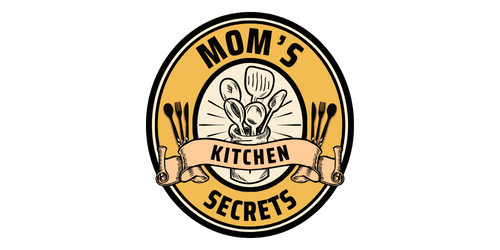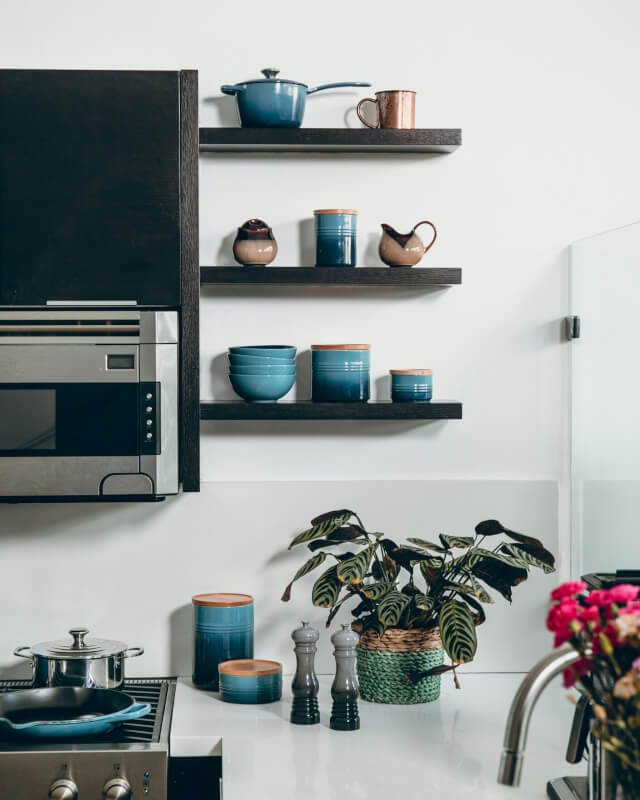In your quest for spotless cookware, stubborn stains can often become a frustrating challenge to tackle. Whether it’s burnt-on food or discoloration that’s left you feeling defeated, fear not! This article will guide you through a few simple yet effective techniques to effortlessly remove those stubborn stains from your precious cooking pots and pans. With these quick and easy methods, you’ll have your cookware looking pristine and ready for your next culinary masterpiece in no time.

Preventing stains
Keeping your cookware clean and stain-free is essential for maintaining its appearance and the quality of your food. By following a few preventive measures and employing the right cleaning techniques, you can easily prevent and remove stubborn stains from your cookware. Here are some tips to get you started:
Proper cleaning after each use
One of the best ways to prevent stains is to clean your cookware thoroughly after each use. It’s important to remove any food residue or oils that may have accumulated during cooking. Simply rinse your cookware with hot water and a mild dish soap, using a sponge or a soft brush to scrub away any stuck-on food particles. Avoid using abrasive materials that can scratch the surface of your cookware.
Using non-stick cookware
Investing in non-stick cookware can greatly help in preventing stains. Non-stick surfaces are designed to repel food and grease, making it easier to clean them. When using non-stick pans or pots, you’ll need less oil and the chances of food sticking to the surface are significantly reduced. This not only makes cleaning a breeze but also extends the lifespan of your cookware.
Seasoning cast iron cookware
For cast iron cookware, proper seasoning is crucial to prevent stains and maintain its non-stick properties. To season your cast iron pan, coat the entire surface with a thin layer of oil or a specially formulated cast iron seasoning oil. Place it in an oven preheated to 350°F (175°C) and let it bake for about an hour. This process creates a protective layer that prevents rust and minimizes sticking.
General methods for removal
No matter how careful you are, stains can occasionally occur on your cookware. Luckily, there are several general methods you can use to remove common stains. Here are a few effective techniques:
Boiling water and dish soap
For tough stains, boiling water and dish soap can work wonders. Fill the stained cookware with water and add a generous amount of dish soap. Bring the mixture to a boil and let it simmer for a few minutes. The heat and soap will help dissolve the stains, making them easier to remove with a sponge or brush.
Soaking in baking soda and water
Baking soda is a versatile cleaning agent that can help tackle stubborn stains. Create a paste by mixing baking soda with a small amount of water until it forms a thick consistency. Apply the paste to the stained areas of your cookware and let it sit for a few hours or overnight. Then, scrub away the stains with a sponge or brush. Baking soda is gentle yet effective, making it a great option for removing various types of stains.
Using vinegar and lemon
Vinegar and lemon are both acidic substances that can aid in stain removal. To use vinegar, fill the stained cookware with a mixture of equal parts vinegar and water and let it sit for a few hours. Then, scrub away the stains with a sponge or brush. For a natural lemon cleanser, cut a lemon in half and sprinkle salt on the cut side. Use the lemon to scrub away the stains, applying gentle pressure. The acidity of both vinegar and lemon helps break down stains and restore the shine of your cookware.
Using a paste of baking soda and hydrogen peroxide
For stubborn stains on metal or enamel-coated cookware, a paste of baking soda and hydrogen peroxide can be highly effective. Mix equal parts of baking soda and hydrogen peroxide to create a thick paste. Apply the paste to the stained areas and let it sit for a few hours. Then, scrub away the stains with a sponge or brush. This powerful combination can easily remove tough stains and restore the original beauty of your cookware.
Applying salt and lemon juice
Salt and lemon juice form another excellent stain-removing duo. Sprinkle a generous amount of salt onto the stained areas of your cookware. Cut a lemon in half and use it as a scrubber, applying gentle pressure while squeezing the juice onto the salt. The acidic lemon juice combined with the abrasiveness of the salt helps remove stains effectively. Rinse your cookware thoroughly after scrubbing to remove any residue.

Removing specific stains
Different stains require specific cleaning techniques to get rid of them effectively. Let’s take a look at how to tackle some of the most common types of stains:
Grease and oil stains
Grease and oil stains are quite common in cookware. To remove them, start by wiping away any excess grease or oil using paper towels. Then, apply a small amount of dish soap or a grease-cutting detergent to the stained area. Use a sponge or brush to scrub the stains gently. Rinse thoroughly with hot water to ensure all the grease and soap residue are removed.
Burnt-on food stains
Burnt-on food stains can be challenging to remove. Begin by filling the cookware with hot water and adding a few tablespoons of baking soda. Let the mixture sit for a few hours or overnight to loosen the burnt-on food particles. Then, scrub the stains with a sponge or brush, applying gentle pressure. If the stains persist, repeat the process or try using a specialized stain remover.
Hard water stains
Hard water stains are caused by minerals in the water and can leave unsightly marks on your cookware. To remove these stains, soak the affected cookware in a mixture of equal parts vinegar and water for a few hours or overnight. The acidic vinegar will dissolve the mineral deposits, making them easy to remove. After soaking, scrub the stains with a sponge or brush and rinse thoroughly.
Rust stains
Rust stains can occur on metal cookware, especially when it is exposed to moisture. To remove rust stains, create a paste using lemon juice or vinegar and salt. Apply the paste to the stained areas and let it sit for a few hours. Then, scrub away the stains with a sponge or brush. For more stubborn rust stains, you can also try using a specialized rust remover or steel wool.
Specialized cleaning techniques
Different types of cookware require specific cleaning techniques to keep them looking their best. Here are some specialized cleaning techniques for different types of cookware:
Cleaning stainless steel cookware
Stainless steel cookware can be cleaned using mild dish soap and warm water. Avoid using abrasive materials that can scratch the surface. For tougher stains, you can create a paste using baking soda and water and apply it to the stains. Let it sit for a few minutes, then scrub gently and rinse thoroughly.
Cleaning copper cookware
Copper cookware requires special care to maintain its shine. To clean copper, create a paste using lemon juice or vinegar and salt. Apply the paste to the copper surfaces and gently scrub with a soft cloth or sponge. Rinse thoroughly and dry with a soft cloth to prevent water spots and tarnishing.
Cleaning cast iron cookware
Cast iron cookware needs to be seasoned and cleaned differently from other types of cookware. After each use, rinse your cast iron cookware with hot water and gently scrub away any food residue. Use a stiff brush or a non-metal scrubber to avoid scratching the surface. Avoid using dish soap on cast iron, as it can remove the seasoning. Instead, dry your cast iron cookware thoroughly to prevent rust and apply a thin coat of cooking oil to maintain its non-stick properties.
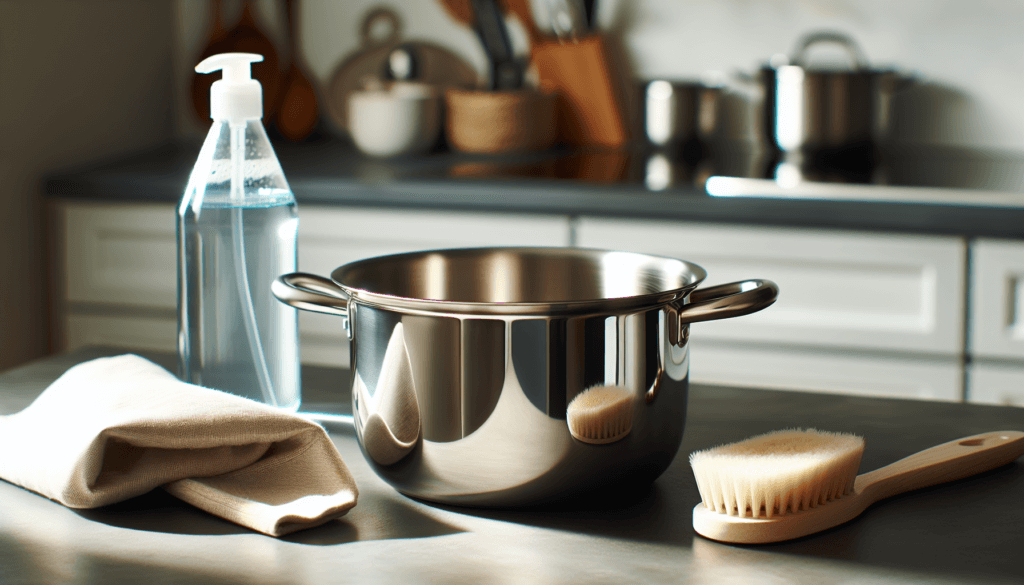
Using natural cleaners
If you prefer using natural cleaners, there are several common household ingredients that can effectively clean your cookware. Here are some natural cleaners you can use:
Using baking soda
Baking soda is a versatile and effective natural cleaner. It can be used to remove stains, eliminate odors, and even polish your cookware. Mix baking soda with water to create a paste and apply it to the stained areas. Let it sit for a few minutes, then scrub with a sponge or brush. Baking soda’s abrasive properties help remove stains without damaging the surface of your cookware.
Using salt
Salt is another natural cleaner that can be used to scrub away stubborn stains. Sprinkle salt onto the stained areas of your cookware and use a sponge or brush to scrub gently. The abrasive nature of salt helps remove stains effectively. Rinse thoroughly to remove any residue.
Using vinegar
Vinegar is an excellent natural cleaner that can remove stains and disinfect your cookware. Fill the stained cookware with a mixture of equal parts vinegar and water and let it sit for a few hours. Then, scrub away the stains with a sponge or brush. Vinegar’s acidity helps dissolve stains and leaves your cookware looking clean and shiny.
Using lemon
Lemon is a natural cleaner with acidic properties that can help remove stains and eliminate odors. Cut a lemon in half and rub it directly on the stained areas of your cookware, squeezing the juice onto the stains. Use the lemon as a scrubber, applying gentle pressure. Rinse thoroughly to remove any lemon residue.
Using hydrogen peroxide
Hydrogen peroxide is a natural alternative to bleach and can be used to remove stubborn stains. Mix hydrogen peroxide with a small amount of water and apply it to the stained areas of your cookware. Let it sit for a few minutes, then scrub with a sponge or brush. Hydrogen peroxide is especially effective for removing tough stains on metal or enamel-coated cookware.
Using dish soap
Sometimes, the simplest solution is the most effective. Mild dish soap mixed with warm water can be used as a natural cleaner for your cookware. Apply a small amount of dish soap to the stained areas, then scrub gently with a sponge or brush. Rinse thoroughly to remove any soap residue.
Cleaning cookware with abrasive materials
In some cases, using abrasive materials can help remove stubborn stains from your cookware. However, it’s important to use them with caution to avoid damaging the surface. Here are a few abrasive materials you can use:
Using steel wool
Steel wool is a highly effective abrasive material for removing tough stains. Choose a fine-grade steel wool that is suitable for your cookware’s surface. Wet the steel wool and gently scrub the stained areas, applying light pressure. Be mindful not to scrub too vigorously to avoid scratching the surface. Rinse thoroughly to remove any steel wool residue.
Using baking soda paste
As mentioned earlier, baking soda can be used as a natural cleaner. To create a more abrasive cleaning paste, mix baking soda with a small amount of water until it forms a thick consistency. Apply the paste to the stained areas and scrub gently with a sponge or brush. The baking soda paste helps remove stains without scratching the surface of your cookware.
Using salt scrub
Salt can also be used as an abrasive material for removing stains. Sprinkle salt onto the stained areas and scrub gently with a sponge or brush. The salt’s abrasive nature helps lift away stains without causing damage. Rinse your cookware thoroughly to remove any salt residue.
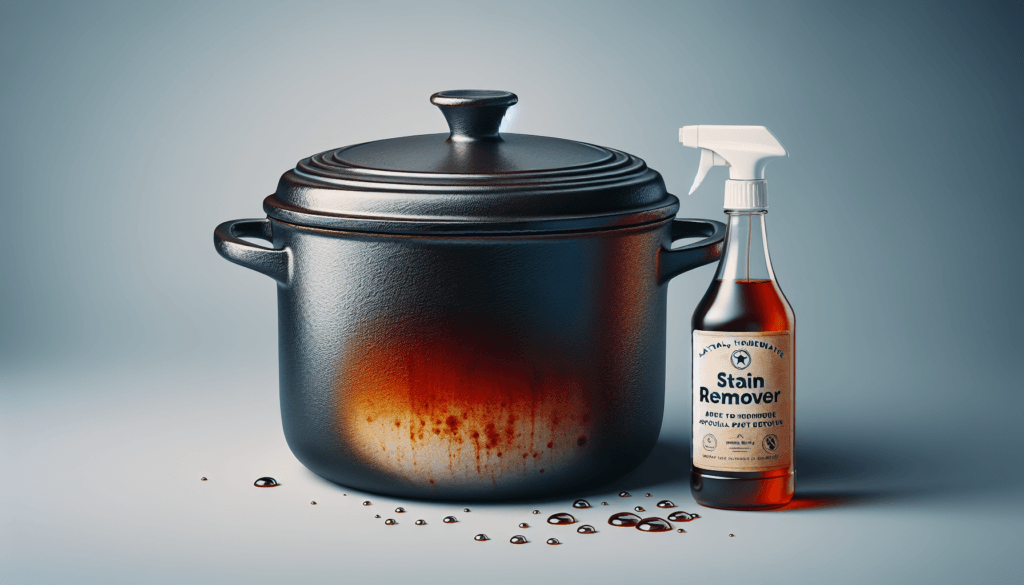
Preventing and removing stains for different types of cookware
Different types of cookware require specific preventive measures and cleaning techniques. Let’s take a closer look at how to prevent and remove stains for various types of cookware:
Non-stick cookware
To prevent stains on non-stick cookware, avoid using metal utensils that can scratch the non-stick surface. Instead, opt for silicone, nylon, or wooden utensils. Clean non-stick cookware using mild dish soap and a soft sponge or brush. Avoid abrasive materials that can damage the non-stick coating. If stains occur, use the general cleaning methods mentioned earlier, as they are safe to use on non-stick surfaces.
Stainless steel cookware
To prevent stains on stainless steel cookware, avoid using harsh cleaners or abrasive materials that can scratch the surface. Instead, clean stainless steel using mild dish soap and warm water. Dry thoroughly to prevent water spots and stains. If stains occur, use specialized stainless steel cleaners or the natural cleaning methods mentioned earlier, as they are gentle on stainless steel.
Copper cookware
Copper cookware requires regular maintenance to prevent stains and maintain its shine. To prevent stains, avoid exposing copper cookware to acidic foods or liquids for extended periods. Clean copper cookware using a paste of lemon juice or vinegar and salt, as mentioned earlier. Rinse thoroughly to remove any residue and dry with a soft cloth to prevent water spots and tarnishing.
Cast iron cookware
To prevent stains on cast iron cookware, regularly season it with a thin layer of oil to protect it from rust and maintain its non-stick properties. Avoid using dish soap on cast iron, as it can remove the seasoning. Instead, gently scrub with hot water and a stiff brush or a non-metal scrubber. If stains occur, use the specialized cleaning techniques mentioned earlier for cast iron cookware.
Enamel-coated cookware
Enamel-coated cookware is durable, but it can still stain if not properly cared for. To prevent stains, avoid using metal utensils that can scratch the enamel. Clean enamel-coated cookware using mild dish soap and warm water. If stains occur, use the general cleaning methods mentioned earlier, as they are safe to use on enamel surfaces. Avoid using abrasive materials that can scratch the enamel.
Glass cookware
Glass cookware is susceptible to stains and scratches. To prevent stains, clean glass cookware immediately after use to avoid food residue drying and sticking to the surface. Avoid using abrasive materials that can scratch the glass. Clean glass cookware using mild dish soap and warm water. For stubborn stains, use the general cleaning methods mentioned earlier, as they are safe for glass surfaces.
Taking care of cookware
In addition to following preventive measures and using the right cleaning techniques, taking proper care of your cookware is essential for its longevity. Here are a few tips to help you take care of your cookware:
Avoiding excessive heat
Many cookware materials can be damaged by exposing them to excessive heat. Avoid cooking on high heat settings unless necessary and use low to medium heat for most cooking tasks. Excessive heat can cause discoloration, warping, and even melting of your cookware. Always follow the manufacturer’s instructions regarding heat limitations for your specific cookware.
Avoiding metal utensils
Using metal utensils can scratch and damage the surface of your cookware, especially non-stick and enamel-coated cookware. Opt for silicone, nylon, or wooden utensils to protect the integrity of your cookware. Metal spatulas or tongs can be used on stainless steel or cast iron cookware, but be cautious not to apply too much force.
Using appropriate cleaning materials
Using the right cleaning materials is crucial to prevent damage to your cookware. Avoid using harsh cleaners, abrasive materials, or metal scrubbers that can scratch or strip the surface. Stick to mild dish soap, baking soda, salt, vinegar, lemon, and other natural cleaners mentioned earlier. Always check the manufacturer’s instructions for any specific cleaning recommendations for your cookware.
Storing cookware properly
Proper storage is essential for preventing scratches and maintaining the quality of your cookware. Avoid stacking heavy pots and pans on top of each other, as this can cause scratching and potential damage. Use soft padding or paper towels between cookware to prevent direct contact. Hang pots and pans on a sturdy pot rack or store them in a cabinet with protective dividers to keep them organized and secure.
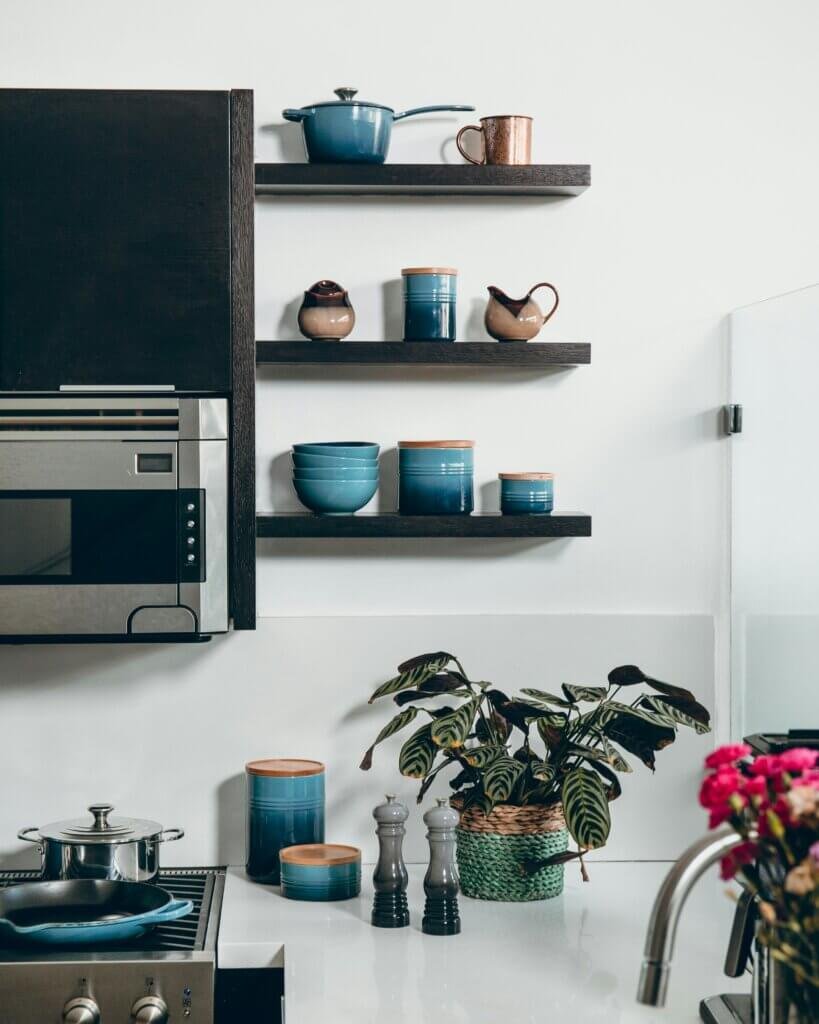
Consulting professionals
Sometimes, despite your best efforts and the use of various cleaning techniques, stubborn stains may persist on your cookware. In such cases, it may be necessary to seek professional help. Here are some instances when consulting professionals can be helpful:
When to seek professional help
If you have tried multiple cleaning methods and the stains on your cookware remain stubborn, it may be time to seek professional help. Professional cleaners have specialized equipment and expertise to handle tough stains and restore the quality of your cookware. Additionally, they can provide advice on preventive measures and offer recommendations for the proper care of your cookware.
Choosing a professional cleaner
When choosing a professional cleaner, do thorough research to find a reputable company with experience in cleaning cookware. Read reviews and ask for recommendations from friends or family who have used their services. Choose a cleaner that specializes in the type of cookware you have, as different materials require different cleaning techniques. Get quotes from multiple cleaners and compare their services before making a decision.
Conclusion
Keeping your cookware clean and stain-free not only enhances the aesthetics of your kitchen but also ensures the longevity and functionality of your cookware. By following preventive measures, employing general cleaning methods, using natural cleaners, and taking proper care of your cookware, you can easily prevent and remove stubborn stains. Remember to use the appropriate cleaning materials and techniques for each type of cookware, and consult professionals when needed. With these tips in mind, you can enjoy cooking with spotless and pristine cookware for years to come.
